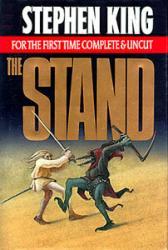
After a super virus wipes out almost 90% of the entire global population, only a handful of survivors remain. That is where The Stand takes place; an America devoid of almost all human life, as the survivors attempt to rebuild their society, all while battling the sadistic Walkin' Dude who is out to destroy them. The novel is long, epic, and deep. It is, however, over 1,000 pages; however, give it time, and you will truly enjoy this journey. I would recommend this book to fans of epics like Lord of the Rings, Stephen King fans, or anyone looking for a good read.
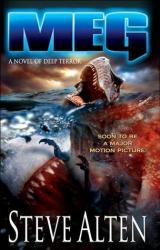
While Jaws may have terrified readers with it's suspense, Meg follows in Peter Benchley's footsteps for only a few steps-and then veers off in a completely different direction. This is a novel all about a small group of scientists trying to kill a gigantic megalodon shark after it escapes from it's hovel in the Marianas Trench. It also has a pinch of scientific mumbo-jumbo and horror to draw all sorts of different readers and to keep you hooked. The characters are diverse, likable, and fleshed-out, and the main antagonist, the 60 foot long megalodon shark, is so entertaining to read about. I would recommend this book to anyone who enjoys action, suspense, or sharks!
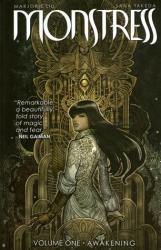
I chose this book because comics are a type of novel that I find interest in. This is a fantasy book that takes place where monsters and humans are divided after a war, and monsters who are caught by humans on the other side are used to be sold and experimented on. The main character, Maika, goes on the other side in search for hope of her mother. This is highly recommended for anyone who enjoys comics.
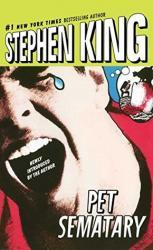
Review: If you have any pets, I recommend removing them from the vicinity!
This novel, coming in at around 400 pages, is a very chilling read. You follow an ordinary family in a not so ordinary town as they attempt to deal with the realization that anyone buried in the cemetery behind their house horrifyingly comes back to life. This all starts when they bury their cat, and they then find it beck in their house. This book is very good, and I would recommend it to anyone who likes horror, thrillers, or maybe people who like zombies.
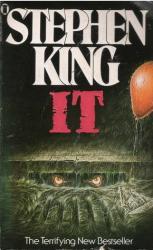
Review: This book is incredible. One of the scariest novels I have ever had the pleasure of reading is also one of the longest. In this book you follow the journey of seven characters - all brilliantly well rounded and fleshed out, if I may add. You alternate between their experiences during childhood and adulthood of facing and fighting the demonic and supernatural clown, Pennywise. I recommend this book to fans of horror and Stephen King, or anyone who enjoys a long read of a good book.
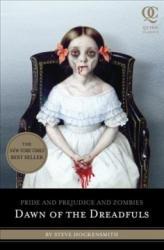
As I’ve mentioned before in my review of Pride and Prejudice and Zombies , I understand the concept of combining this classic piece of romantic literature with its complete obverse; it just felt like it was almost held back from its full potential by adhering to (most of) the original manuscript. With the prequel to this book, Dawn of the Dreadfuls manages to examine the ridiculous nature of this mashup in a way that’s so tongue-in-cheek that the tongue has practically ruptured the cheek entirely.
That is, this prequel doesn’t take itself nearly as seriously as the original Jane Austen adaptation did.
Even if the non-Pride and Prejudice and Zombies characters were mostly cartoonish in their representation of stereotypes and tropes, they were fun to read as they provided a delightful offset to the canonical characters of the Bennet family. Also, instead of trying to find some boring section of text wherein to insert some zombie excitement, Dawn of the Dreadfuls provides equal parts action and society to accommodate a balance that highlighted the extreme disparity between the two. In fact, when the two finally meet, it’s during the exciting climax of the story. Of course, knowing this is a prequel means there has to be some way out of the predicament; otherwise the original Pride and Prejudice and Zombies book cannot take place.
Despite all the things it has going for it, Dawn of the Dreadfuls suffers from a plot that seems to drag along like the un-functioning foot of a zombie. Sure, each plot point has its purpose, but they almost seem to belabor the point. There were a few chapters where I felt the plot to be somewhat repetitive if it weren’t for a slightly different outcome to show character growth. In any case, I’d still prefer this book over Pride and Prejudice and Zombies.
A prequel that could fully explore a ridiculous combination, I give Dawn of the Dreadfuls 3.5 stars out of 5.
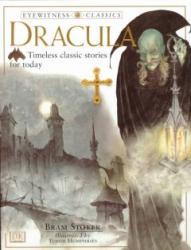
Twilight, Count Von Count, Nosferatu, where do all of these vampire themed genres come from? Also, where do all the vampire cliches come from? I mean why do they hate garlic, can only be killed with a steak through the heart, and have no reflection in a mirror? All of this goes back to the novel Dracula by Bram Stoker. This 1897 gothic horror novel was written during the Victorian Era, a period many consider of high etiquette and stern morality.
The best part about this novel is that there is no one point of view, the story is written in segments of diary entries and newspaper articles. We get to see the story from multiple characters’ views, which is absolutely phenomenal because it creates dramatic irony and suspense. In Dracula, we follow the story of 7 people as they discover the existence of Count Dracula as a vampire. When one of the 7 become a victim of the Count, the rest set out to exterminate the Count and rid him of the world. I recommend this book to all readers (high school and above as the vocabulary and style is somewhat
difficult) as this teaches all of us about the evolution of contemporary culture and the culture of the Victorian Era. Reviewer Grade 12.
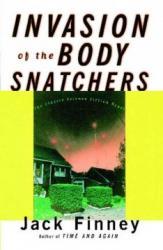
Most people know this book by its numerous film adaptations, including Invasion of the Body Snatchers (1956 and 1978), Body Snatchers (1993), and The Invasion (2007). In fact, I like to think that many facets of this story have become a part of popular culture, including the replication “pods” and Donald Sutherland’s scream in the 1978 film version. While the source material is inherently pulpy, a result of the genre and the era in which it was published, there is an entertaining quality to the story that has allowed it to survive for so long.
Simple in its execution, but brilliant in its reveal, The Body Snatchers builds up an inherent distrust of the people surrounding the main characters as they investigate why everyone seems “off” in this small, California town. While the full explanation of the aliens’ presence and purpose is relegated to an enormous information dump more than half-way through the book, it nevertheless contains some interesting ideas and concepts that could be plausible given the circumstances. I would have preferred better integration of this information into the plot, but sometimes the characters just need to sit down and explore these ideas in depth.
In the end, The Body Snatchers has plenty of strong moments in its plot. Sure, there’s the weaker section or two, and the more upbeat ending didn’t have much explanation other than the aliens’ annoyance of humanity’s persistence. Still, it’s a fun story, and even decades later it’s clear why The Body Snatchers is a timeless classic, even if it’s not “on par” with more significant literary titans. Maybe that’s its charm, though. By making it about the “everyman,” the horror and terror of everyone around them being replaced by emotionless beings is much more relatable on a visceral level.
A timeless pulp classic, I give The Body Snatchers 4.0 stars out of 5.
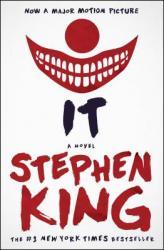
IT, is like no other when it comes to Stephen King classics. First, with the book cultivating a generation in 1986, then another with its film adaptation in 1990, and now, in 2017, with its revival. IT is timeless for thrill seekers who enjoy reading the horror genre. Stephen King craftly draws out the story for so long while keeping the audience captivated most of the time. Like any book, IT has some lengthy parts with extra detail that you could go without, yet I feel it adds to the story and the experience of reading the book. This book is highly recommended for attentive readers who are interested in a slow suspenseful story. The tone throughout the book is tense, and always seems to be building up to something creating thrill.
I was initially drawn to this book because I adore horror movies. I thought reading a horror book would give me the same sense of adrenaline. Boy was I wrong. Reading this book was scarier than any horror movie that I have ever sat through. Something about how Stephen King gives so much detail while still somehow leaving everything to the reader’s imagination is magnificent. I started reading IT just before the new movie came out in hopes of finishing it before I went to see the film. Yet, the book is so long I didn't end up seeing the movie the month it came out.
The story takes place in a rather odd town called Derry in the 80’s. It follows a group of misfit teens who are battling their worst nightmare. Their character development and growth as a child is phonomonel and continues as the characters return as adults to once again battle IT. The story takes place in two different time periods with the same characters and jumps between the two respectively. For me, however, it did get confusing at times, trying to keep track of if the characters were adults or teens while picking up where I left off. Other than that the book is consistent and addictive and I would highly recommend it.
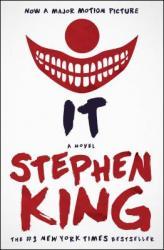
This novel follows the lives of five kids in a town called Derry. They bond together over their terror of It, an evil being that has a hold of their small town. They struggle overcome It with little support or understanding from the world around them. I choose to read this book because I knew the movie was coming out but being the book freak I am, I wanted to read it before I saw the movie adaption. I have to say after seeing both the old movie, the new movie, and reading the book, that the book was the most scary of the three. King writes with zero censor and hits on topics typically labeled taboo. The thing I like most about this novel was its ability to really impact me and make my skin crawl. Since its a horror novel “creepy” or frightening things are bound to be included but for me the most alarming parts of this book were some of the more realistic events such as spouse and animal abuse. This novel was not at all predictable, you just had to keep reading to see how the story would unfold. I know most people are set off by the size of the book but I have to say I never found myself bored or thinking that the parts King wrote were irrelevant. This was the first Stephen King novel I’ve ever read but I would definitely recommend it and will be reading more of his work. Due to the fact that the story was unlike anything else I’ve ever read I would say it's one of the best books I’ve read this year.
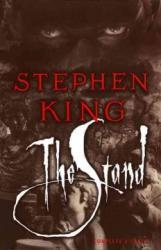
The book "The Stand" by Stephen King is a novel about a disease. It starts out at a gas station where the disease is first seen in the novel. This book has many different characters as it progresses. The main antagonist is the embodiment of evil. He is basically the Antichrist. Although I didn't like this book as much as some of Stephen's other works because I have a short attention span and some parts are not attention grabbing. It is still a very good book and I would definitely recommend it to anyone who likes horror. This novel is very unpredictable which is one of the main reasons I like it as much as I do. Because there are so many characters in this book, it was very easy for me to relate to their situations.
Reviewer Grade: 9
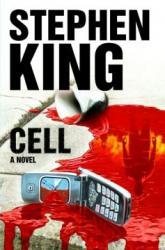
The book "cell" by Stephen king is a book about learning to cope with the apocalypse. The apocalypse in this book is very unique and diverse from your typical zombie virus outbreak. While the main character, Clay, is out getting ice cream he watches as people answer their phones. They all start going crazy after they've answered the call, spitting out nonsense and being extremely violent towards each other. He was the only person there without a phone. Through out the story new characters are gained and then lost. I liked this book because I have a lot of trouble finding books that grab my attention. I really enjoyed reading this book, it was very action filled. There were no dull moments. I chose to read this book because of hype around the movie "It". I really liked the movie so I decided to read some of his other work. I would recommend this book to anyone who like very exciting, sad, emotional, and/or mysterious novels.
Reviewer Grade:9
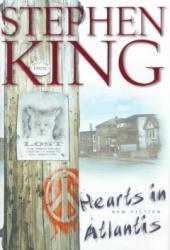
When I started Hearts in Atlantis, all I knew about it was that it was written by Stephen King and there was a movie of the same name that was likely based on it. As I began to read, I found myself enthralled by the coming-of-age story that presented itself. I had no idea it connected to the Dark Tower series, but that detail was almost ancillary, a neat little connection into a bigger picture. Having made it half-way through the book, I wanted to follow the main character’s development into adulthood but, then the story suddenly stopped.
Instead of following a story that had engaged me, the focus shifted to a completely different character, only loosely tied to the events in the first half of the book via one of the characters, who was now in college. Almost in a fractal fashion, this story was half as long as the first, with each successive story growing shorter and shorter, while still being connected to the first narrative in some way, no matter how loose that connection might have been. Finally, the story returns to the main character of the first section, but only stays long enough to say goodbye.
I absolutely loved the first story in this “collection,” and by its strength alone, I would recommend this to anyone. However, the second half of the book felt too disjointed to be interesting, especially with all the emotional energy I had invested in the first story. Sure, they were somewhat interesting in their own ways, showing the relentless march of time toward the modern era, but they simply lacked that fantastical little spark from the first story (incidentally, the same spark that was connected to the Dark Tower series).
A great story with almost unnecessary add-ons, I give Hearts in Atlantis 3.5 stars out of 5.
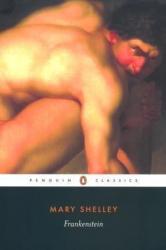
Mary Shelley's Frankenstein is a book about the horrors of creating life. The book succeeds in developing most of the sidecharacters. You learn in depth about all of their pasts, and the story fits together well. The tragic plot line of the book shows how the decisions made by Frankenstein, the creator of the monster, comes back to haunt him. It almost becomes a game of cat and mouse when Frankenstein chases around his creation for revenge when really, the monster is haunting Frankenstein for his own revenge. Most of the book's themes include loneliness and rejection, and are explained well throughout the back stories of the characters. I feel that the book's only weak point is how the characters face their end. While the characters do indeed learn many life lessons, they never really accomplish anything. None of the characters have sentimental deaths, other than Frankenstein; the book just tells the reader that the character you have just grown attached to...well, dies. The book moves on from their deaths, and then the cycle repeats for the rest of the book. Overall, Frankenstein is a really good book, and I'd recommend it to people that like horror or mystery fiction.
Grade: 8
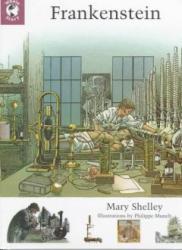
Frankenstein was a disappointment to me. As per the Romantic period, this novel used lots of scenes in nature to explain the characters’ emotional states. I do not mind a few good cries in a storm, but this novel borders on incessant outdoor melodrama. I decided to disregard both the plot and the setting in a vain attempt to enjoy the novel. I would only focus on the characters. As this was written by a female author, I looked forward to the female characters, which were awful. One, Justine, is a servant and seems only to exist in order to die. Elizabeth, who also seems to share this quality, is regarded as an object to be owned in a creepy incestuous manner by her cousin; she is apparently superior and virtuous only because of her noble birth. So, I dismissed the female characters to focus on the males, none of which were believable. Victor, his friend Henry, and his monster all were overly emotional, and they inspired no sympathy from me. With no likable characters and emotions running everywhere, I would only read Frankenstein if required.
Reviewer Grade: 9
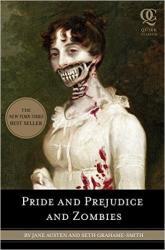
Back in the zombie heyday of 2009, the idea of combining one of the most feminine pieces of literature with the oft masculine-marketed gory violence seemed like an interesting idea. I, for one, didn’t particularly care to read Jane Austen’s Pride and Prejudice , but this take on the romantic classic certainly piqued my interest. Because of the addition of zombies to this plot, I was impelled to read this story to see how these drastically different archetypes were combined. I certainly wonder if the book would have been more enjoyable if I had read Pride and Prejudice beforehand, or if I would have remained far abreast of it altogether.
Partly due to the severe dichotomy of the original story and the zombie additions, there were certainly moments where I could tell what segments of Jane Austen’s plot were modified to fit the new, apocalyptic sensibilities.
The two concepts worked together somewhat, occasionally adding action to a scene that would have likely been boring in its predecessor, but in maintaining the story and outcomes of the original, the whole experiment didn’t quite “gel” as it could have. Perhaps the addition of the prequel and sequel to this book helps to round out these distinct edges, but I have yet to read those books yet.
When it comes right down to it, I struggled to get through this book. With the language and verbiage retaining is feel from the original, the archaic nature of the dialogue was not as easy to read as I would have hoped. In the end, I was practically just reading Pride and Prejudice, but occasionally “changing the channel” to a zombie film whenever anything became boring.
I applaud Seth Grahame-Smith for following through on this ambitious idea, but it almost seems like anyone could easily merge zombies to a romantic classic if they maintain the majority of the source material.
An intriguing idea that never quite fully “connects,” I give Pride and Prejudice and Zombies 3.0 stars out of 5.
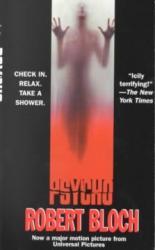
Once again, I find that the source material on which a famous movie is based is equally as good and equally as famous. What strikes me as interesting is that the quick turn on some of these literary masterpieces from page to screen has largely remained unchanged. Gone with the Wind only took three years before its film debut, The Martian took four years, and Psycho only took one. Clearly, these stories are practically screaming to be made into movies, and most have done quite well as the cultural icons of their age.
Of course, having already seen the film on which this book was based, I was well aware of the twist ending. Nevertheless, reading through this book was almost enhanced by this a priori knowledge as one would probably not have guessed the twist if they were reading it for the very first time. There are just little hints here and there that something is off, but it’s not until close to the end that we find out that everything is not as it initially seemed. Even the visuals provided in the film version helped to aid my imagination in establishing the setting and characters.
And yet, as there always is, there are some differences in the book that did not make it into the movie. I wonder if Norman Bates was made a lot slimmer in the film partly due to Hitchcock’s portly frame. In the book, his overweight body adds a layer to the character (both literally and metaphorically) which helps flesh out (Har har. OK, I’ll stop) more of the explanations as to why Bates ended up this way. Much like One Flew Over the Cuckoo’s Nest, being able to get into the mind of Norman Bates was a fascinating examination of someone with a severe mental illness.
A fantastic read equally on par with the Hitchcock classic, I give Psycho 5.0 stars out of 5.
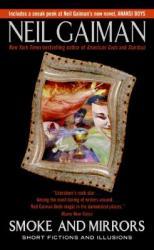
As someone who has to read many short story submissions for the anthology my writing group puts together each year, I can appreciate a well-written short story. I have not read much of Neil Gaiman, but in his collection of anthology short stories, Smoke and Mirrors, I was able to see what kinds of stories a professional writer writes for an anthology. While quite a few stories were interesting, not all of them were necessarily in genres I typically read. Then again, I consider erotica and stories submitted to Hustler as pornography, which is why I do not read these kinds of short stories.
Furthermore, it is a little more uncomfortable listening to erotica, as was the case with this audiobook. Fortunately, Gilbert Gottfried did not read it, but it still is uncomfortable to hear it nonetheless. Sure, the concepts in these short stories were somewhat interesting, but the sex ruined it for me. At least there were enough other stories that I found fascinating to make it worth my while to get all the way through it. The simplicity and genius of these ideas merely verify Gaiman’s writing talent, even if a few were hard to follow. At least a few of them followed the title of the book, which helped tie these separate stories together.
Perhaps my biggest qualm with this book was its structure. Moreover, maybe it was a limitation of a direct transferal to the audiobook format, but it is almost impossible to go back to the first section of the book and listen to the intro for each story before reading that story. Instead, it dispensed pertinent information on every short story before I even had a chance to get to them. If I were to appreciate each story fully, it would have been better to introduce each one with background information, so the context is fresh in the listener’s memory.
A collection of well-written short stories, I give Smoke and Mirrors 3.5 stars out of 5.
For more reviews of books and movies like this, please visit www.benjamin-m-weilert.com
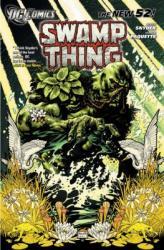
"Swamp Thing: Volume One, Raise Them Bones" is the beginning of Scott Snyder (author) and Yanick Paquette (illustrator)’s visceral, mythic run on the comic, which I recommend heartily to fans of horror/grotesque gothic stories.
Detailing the eternal conflict between the Green (plant life), the Red (animal life) and the Rot that would consume and twist everything, Snyder’s interpretation of Swamp Thing is full of haunting imagery and interesting worldbuilding. Later on, the comic run is taken over by Charles Soule, who does a lovely (albeit very different) job carrying on the story.
For now, though – renowned botanist Alec Holland has been chosen by the Green to shed his humanity and become their knight. Will he go willingly? And what will become of him now that he’s been claimed, whatever he chooses to do?
Warnings:
-- This book is suited for older audiences, in my opinion, and definitely not children. The illustrations are often what one might call “graphic.” Be warned. It is something of a horror comic.
-- If you like this first volume and keep on with the series, just know that during the Rotworld arc, "Swamp Thing" crosses over with Jeff Lemire’s "Animal Man." It may behoove readers to pick up "Animal Man: Volume Three, Rotworld," at least, in order to get a complete look at the story. :)
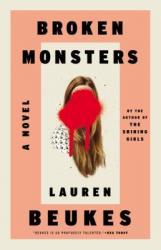
Broken Monsters is a thriller set in Detroit in which a detective investigates a serial killer who murders people with a nail gun and then attempts to meld their bodies with those of animals -- or at least, that's how it starts out. The chapters rotate between the perspectives of Gabriella Versado, the detective investigating the case; Layla, her teenage daughter (currently embroiled in a plot to lure out and expose pedophiles); Jonno, a journalist who quit his job and moved to Detroit to reinvent himself by reporting on their art scene; TK, a homeless man working to protect his friends and community; and our serial killer, who finds himself infected by a dream that seems to have the power to rewrite reality itself. While it initially seems like a pretty standard thriller, the murders quickly veer off into the realm of the supernatural. The book is a bit uneven as a result, ending up as a mix of magical undertones plus serial killer crime investigation plus family drama that never quite came together for me. The writing wasn't amazing by any means, but it got the job done, and the plot managed to keep me turning pages. Despite having heard some rave reviews from others, I wasn't wowed by it, but if you're a fan of horror/thrillers this is definitely unique.



 Ruth Holley Library will be temporarily closed for approximately one week starting Mon., Dec. 2 to complete roof repairs.
Ruth Holley Library will be temporarily closed for approximately one week starting Mon., Dec. 2 to complete roof repairs.